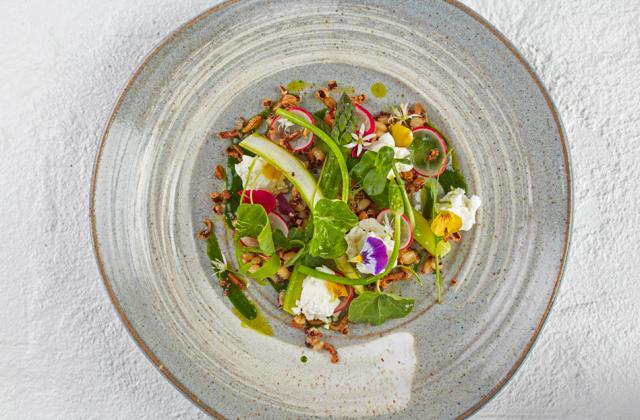Before taking on the role as head chef at Simpsons, Birmingham, Nathan Eades owned his own restaurant, Epi. This experience enabled Nathan to learn and understand the many complicated elements required to run a business, and in turn helped him to empathise with Simpsons chef owner Andreas Antona and chef director Luke Tipping.
Nathan, after completing a course at Worcester College, started his career at Nailcote Hall in Warwickshire. For the next 11 years, Nathan worked at various hotels across the country and abroad, before chasing the dream to open his own restaurant.
We spoke to Nathan about his responsibilities at Simpsons and the journey he took getting to where he is now – including his application to join the RAF!
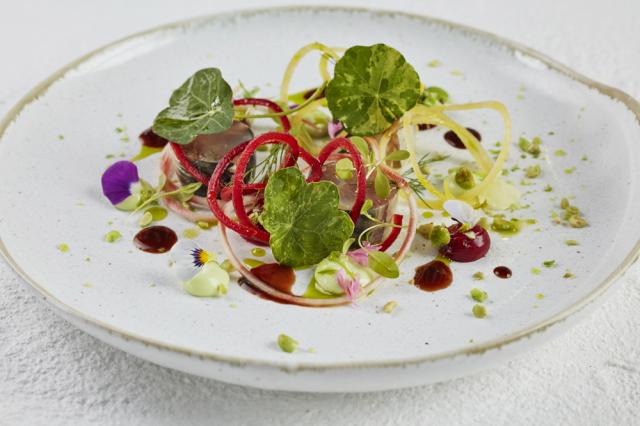 Why did you want to be a chef?
Why did you want to be a chef?
It’s quite cliché really, I fell into it. I was about 16 and had finished my first year of sixth form. I came to realise that I didn’t want to go to university. At the weekends I had a job washing pots in a local pub. One Saturday night they were struggling for chefs and I was brought over to do the deep fried garlic mushrooms. The bug started from there really!
You originally wanted to join the RAF, do you still wish you could have taken that career path?
Once I had realised I didn’t want to pursue university, I applied for the RAF. My eyesight was one of the reasons I didn’t get in so I stopped at that point I’ve never had a burning desire from then to try again. I suppose fate took a big part in it, because that’s what encouraged me to start cooking.
You opened your own restaurant, Epi, before starting your journey with Simpsons. How did being chef owner of Epi prepare you for the role at Simpsons?
Prior to that, I was sous chef and senior sous in various places, and in those positions you almost get tunnel vision into thinking the food is the main part of any business, which of course it is but there’s so many more elements of business that you take for granted. Like organising waste disposal, insurances, working out the percentages of wage costs, what your utility fixed costs are and all of the other things that go on behind-the-scenes.
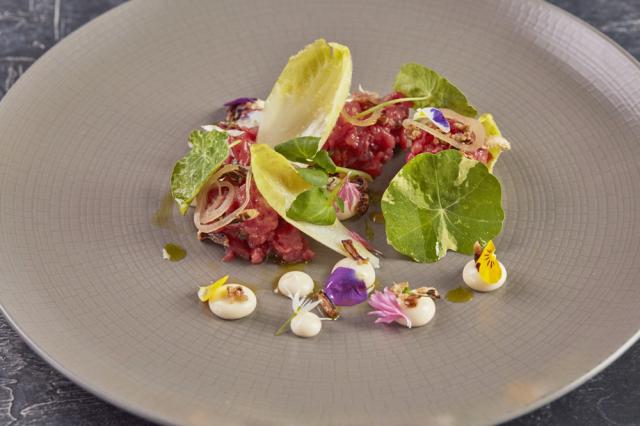 That played a massive part in me growing up and realising what we do is just food, and if you want it to be a successful business there are so many more nooks and crannies that are much more important. These experiences prepared me fantastically well, and now I can understand why Luke, Andreas and the accountant are nagging me to get the wages down. I always think of this old saying: “if you look after the pennies, the pounds will follow”, that’s very true.
That played a massive part in me growing up and realising what we do is just food, and if you want it to be a successful business there are so many more nooks and crannies that are much more important. These experiences prepared me fantastically well, and now I can understand why Luke, Andreas and the accountant are nagging me to get the wages down. I always think of this old saying: “if you look after the pennies, the pounds will follow”, that’s very true.
Most of your training came from working in hotels, such as Lainston House and Swinfen Hall. How does working in a hotel differ to working in a restaurant?
You don’t have to get up for breakfast! In a nutshell that is it. All of the hotels I’ve worked in both here and abroad were fantastic foundations for me but in all honestly I knew I didn’t want to do banqueting, I wanted to be concentrating on what I am good at and what I enjoy doing, which is al a carte service and to do it in the best restaurant in Birmingham is a dream come true.
Info Bar
Dream restaurant
I’d probably go back to Vancouver, if my wife would allow it! It would be very simple, bistro style food, with classic dishes done really well, nothing fancy. I’d like to run a restaurant where chefs would want to eat.
Dream Brigade
Mikael Jonsson - Canapés
Marco Pierre White (Back in the Harvey days) - Garde Manger
Pascal Barbot - Meat and Fish
Daniel Humm - Sauce
Magnus Nilsson - Garnish
Michel Roux Jnr - Pastry
So it was quite a natural move for you then?
Definitely, that was one of the reasons why I set up my own restaurant. I was fed up of slinging out sausages and bacon at 6:30 in the morning. It was the end of that career path for me. Hotels are ok, you get a nice steady amount of business throughout the year, but I couldn’t be doing with the rest of the business that makes a hotel function.
How did you end up working for Luke Tipping?
Funny story really, he was a friend of a friend. I had finished work at Epi and rang up a good friend of mine who is a recruiter in Birmingham. He said ‘why don’t you apply for the job at Simpsons?’ I like to think I’m a humble guy and I played down for quite a while, but the friend was quite insistent that I met Luke. So I did, and we hit it off straight away, chatting about food and football; it just seemed like we had known each other for years and not ten minutes.
Luke is a very down to earth working class guy, nothing seems to faze him. At Simpsons we have something called the wooden spoon


 Why did you want to be a chef?
Why did you want to be a chef?  That played a massive part in me growing up and realising what we do is just food, and if you want it to be a successful business there are so many more nooks and crannies that are much more important. These experiences prepared me fantastically well, and now I can understand why Luke, Andreas and the accountant are nagging me to get the wages down. I always think of this old saying: “if you look after the pennies, the pounds will follow”, that’s very true.
That played a massive part in me growing up and realising what we do is just food, and if you want it to be a successful business there are so many more nooks and crannies that are much more important. These experiences prepared me fantastically well, and now I can understand why Luke, Andreas and the accountant are nagging me to get the wages down. I always think of this old saying: “if you look after the pennies, the pounds will follow”, that’s very true.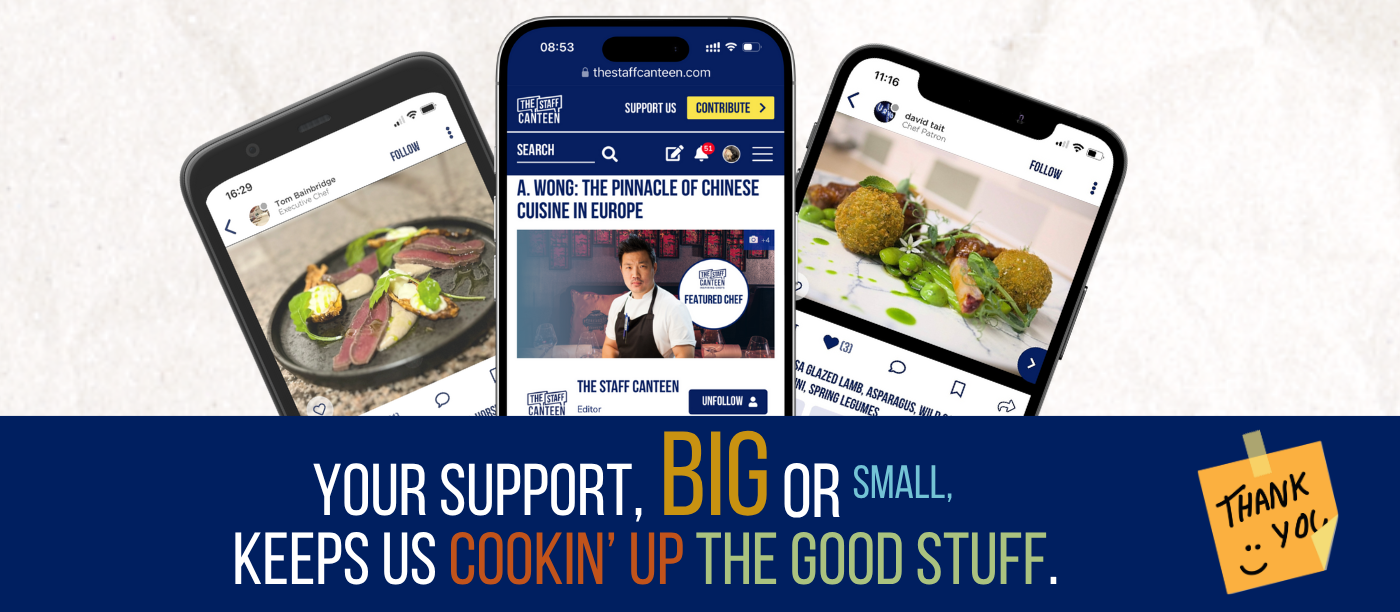
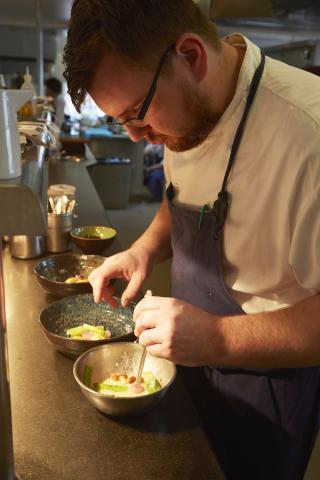 Has Luke influenced your style? Is it hard to find your own style?
Has Luke influenced your style? Is it hard to find your own style? 